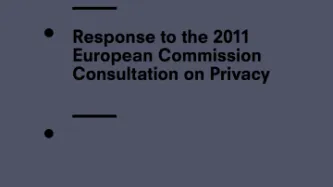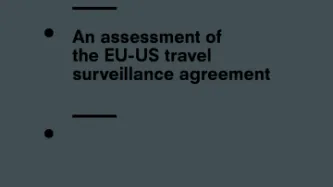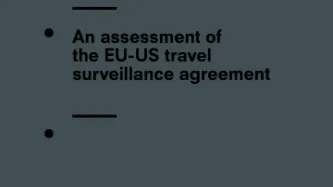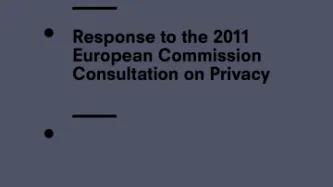Search
Content type: News & Analysis
On 25th January 2012, the European Commission published a proposal that would comprehensively reform the European data protection legal regime. One aspect of the proposal, a new Regulation (the “Proposed Regulation”),1 would modernise and further harmonise the data protection regime created by the Data Protection Directive (95/46/EC). Another aspect of the Commission’s proposal, a new Directive (the “Proposed Directive”), would set out new rules on “the protection of individuals with…
Content type: Report
Following on from their 2009 discussion paper, in 2010 the European Commission published a Communication on changes to the 1995 European Union Directive on data protection. The European Union’s 1995 Directive on data protection is a leading regional instrument for privacy and is often the model for other countries across the globe. The Directive has been integral to pushing back against key surveillance and tracking initiaitives by governments and industry.In this report we respond to that…
Content type: Report
The US does not have a general overarching privacy law like European Data Directive or the sweeping privacy protections contained in the European declarations of rights. The EU-US accord cites several laws, which it claims, give privacy rights to non-US persons. None of the cited laws offer any real substantive or procedural protections for Europeans. As explained below, the one law – the Privacy Act 5 U.S.C 552a – that could offer some modest protections is tellingly not even mentioned.
But…
Content type: Report
This is a memo prepared by Barry Steinhardt of Friends of Privacy USA for Members of the European Parliament regarding the proposed EU-US Agreement PNR.
The proposed agreement regarding Passenger Name Records (PNR) between the United States and the European Union is riddled with faulty assertions and assumptions about US law and the actual operations of the US government.
These faulty assertions and assumptions go to the heart of the agreement and undercut the claims of protections for…
Content type: Report
Following on from their 2009 discussion paper, in 2010 the European Commission published a Communication on changes to the 1995 European Union Directive on data protection. The European Union’s 1995 Directive on data protection is a leading regional instrument for privacy and is often the model for other countries across the globe. The Directive has been integral to pushing back against key surveillance and tracking initiaitives by governments and industry.
In this report we respond to that…
Content type: News & Analysis
A widely-leaked version of the first legislative proposal for a General Data Protection Regulation is making its way through Brussels and beyond. The purpose of this 'Regulation' is to provide a new tool for harmonising the protection of personal data across the European Union, and one that takes into consideration the current legislative and technological environment. The key point is that Europe's rules on privacy are often taken as an example to the world -- and provide a rare…
Content type: News & Analysis
PI just received a response from Secretary General Thorbjørn Jagland of the Council of Europe (CoE) stating that the CoE is refusing to start an investigation on the collection and storage of citizens biometric data by member states. On 31 March an international alliance of organisations and individuals lodged a petition calling on him to start such an indepth survey under Article 52 of the European Convention on Human Rights (ECHR).
In his answer, received this week, Secretary…
Content type: News & Analysis
The European Commission is about to announce the compulsory fingerprinting of all visitors to the EU, both visa holders and non-visa holders, along with automated border checks of EU nationals through the analysis of fingerprints and facial scans.
The Communication from December 2007, available here on the PI site, outlines the plans. Below we summarise the plans. Also see PI's commentary in the Guardian CommentisFree section from February 11, 2008.
Critical Analysis
The Communication does…
Content type: News & Analysis
Privacy International and the American Civil Liberties Union have appealed to the Council of the European Union, the European Commission, the European Parliament, and privacy commissioners in 31 countries across Europe to repeal the agreement between the EU and the US on passenger data transfers. We argue that, with the recent disclosure of the 'Automated Targeting System' being used by the US Department of Homeland Security, the US has violated both American law and the agreement with the EU…
Content type: News & Analysis
The European Parliament voted today to adopt a new directive allowing for the retention of data "generated by telephony, SMS and internet, but not the content of the information communicated". This data includes email addresses and location data from cell phones. The directive is highly controversial due to the impact it will have on the privacy of European Union citizens.
Also of concern is the broad discretion that is left to EU member states. For example, data may be accessed for the…
Content type: News & Analysis
In a move that mimics the U.S. fingerprinting policy under the VISIT programme, the European Commission has adopted a proposal for a regulation that would create a central database for all visa applicants fingerprints and photos. Regulation available on the Europa website.
In a somewhat positive turn, it is important to note that the retention period of this data is only five years, compared to 100 years in the U.S. Relevant excerpts include:
To ensure exact verification and…










